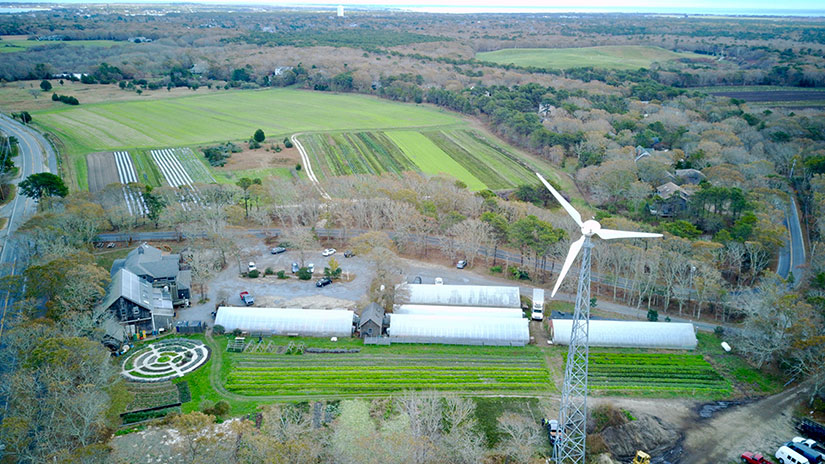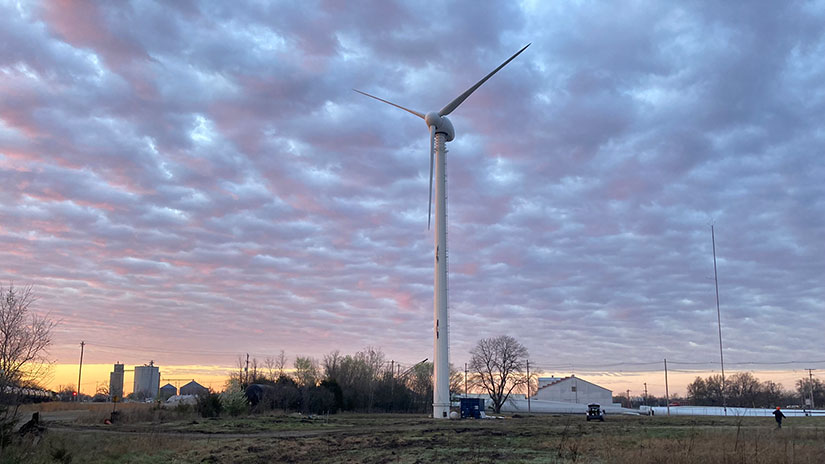Farmers, Rural Businesses To Harvest Benefits of New Project Selections
Competitiveness Improvement Project Awards Tap Distributed Wind Energy’s Potential in Agricultural Settings

A new crop of Competitiveness Improvement Project (CIP) award selections will benefit farmers and small rural businesses by focusing on how to remove market barriers to distributed wind turbine deployment in agricultural settings.
Through CIP, the U.S. Department of Energy (DOE) has announced plans to award $3.2 million to 12 American component suppliers and manufacturers of small- and medium-sized wind turbines for 13 new projects. Targeting rural agriculture markets, the 2024 CIP selections support the U.S. Department of Agriculture (USDA) and DOE’s new Rural and Agricultural Income & Savings from Renewable Energy (RAISE) initiative, which supports distributed wind as part of the White House’s clean energy goals.
Managed by the National Renewable Energy Laboratory (NREL) on behalf of DOE’s Wind Energy Technologies Office (WETO) since 2012, CIP is designed to make distributed wind energy technologies more cost competitive, reliable, grid compatible, and accessible. In addition, CIP projects advance innovations that enable distributed wind energy technologies to be used in emerging distributed generation markets.
“By funding the development of wind energy technologies that increase cost savings and revenue-generation opportunities for rural small businesses and farmers, CIP is helping tap the potential for distributed wind energy within America’s agricultural communities,” said Brent Summerville, NREL distributed wind energy researcher and CIP program lead. Distributed wind energy is used at or near where it is generated.
According to NREL’s 2022 Distributed Wind Futures Study, the United States has the potential to profitably deploy nearly 1,400 gigawatts of distributed wind energy capacity—more than half the nation’s current annual electricity consumption. Agricultural lands in the Midwest and heartland make up 70% of this potential.

“CIP advances distributed wind technology to ensure that distributed energy consumers have options that are certified for performance and quality,” Summerville said. “CIP also strengthens distributed wind technology commercialization, market expansion, and deployment while supporting partnerships among distributed wind developers, farm groups, and agribusinesses.”
2024 Project Selections Focus on Farmers, Small Agricultural Businesses
Companies selected to receive 2024 CIP awards will now enter negotiations with NREL to receive cost-shared subcontracts and technical support. Selected companies include several former CIP awardees and some that are new to the program: A manufacturer of a 1-megawatt (MW) wind turbine (the largest turbine that can qualify for CIP funding), a vertical-axis wind turbine manufacturer, and an Alaska-based developer.
Once the 2024 contracts are finalized, NREL will have awarded 77 subcontracts to 30 companies, totaling $18.5 million in DOE funding while leveraging $11.2 million in additional private sector investment since CIP began in 2012.
The 2024 award categories and selections are:
Prototype Installation and Testing
Designed to determine the commercial readiness of a prototype wind turbine system, these projects confirm turbine designs or improvements that are ready for certification testing.
- Accelerate Wind (Birmingham, Alabama) will perform full-scale testing of its 12-kilowatt (kW) prototype rooftop wind turbine.
- Pecos Wind Power (Somerville, Massachusetts) will perform testing of its 85-kW PW85 prototype turbine.
Small Turbine Certification and Listing
These projects help manufacturers of turbines up to 150-kW peak power pursue certification to ANSI/ACP 101-1-2021: The Small Wind Turbine Standard or listing of the turbine assembly or component(s) to applicable electrical safety standards.
- NPS Solutions (Darien, Connecticut) will pursue certification of the NPS 100C-24-37 turbine to the ACP 101-1-2021 standard and list the system to UL 6141.
- Sonsight Wind (Grayson, Georgia) will pursue certification of its 3.5-kW turbine to the ACP 101-1-2021 standard and list the generator, controller, and diversion load to electrical safety standards.
- Uprise Energy (San Diego, California) will pursue certification of its 10-kW deployable turbine system to the ACP 101-1-2021 standard and list the system to UL 6142.
Type Certification and Listing
These projects help manufacturers of turbines up to 1-MW rated power seek type certification through the International Electrotechnical Commission System for Certification to Standards Relating to Equipment for Use in Renewable Energy Applications (IECRE) or list turbine assembly or component(s) to applicable electrical safety standards.
- Chava Wind (Homestead, Florida) will pursue IECRE type certification of its 21-kW vertical-axis wind turbine.
Inverter Listing
These projects address the need for listed inverters built and tested specifically for small- and medium-scale wind turbines.
- Eocycle America Corporation (Swanton, Vermont) will pursue the listing of its EOS S-16 turbine to UL 1741-SB.
- EWT Americas (Bloomington, Minnesota) will pursue the listing of its 1-MW inverter to UL 1741-SB.
- Windurance LLC (Coraopolis, Pennsylvania) will upgrade its 90-kW inverter to a 120-kW rating and pursue UL 1741-SB listing.
Manufacturing Process Innovation
These projects support designing, building, and validating improved manufacturing processes for a defined production of a wind turbine, leading to a reduced levelized cost of energy.
- Bergey Windpower Company (Norman, Oklahoma) will implement advanced blade manufacturing processes to reduce costs and help meet growing demand.
Product Commercialization and Market Development
Focused specifically on rural and agricultural market opportunities identified in NREL’s 2022 Distributed Wind Futures Study, these projects address cost barriers to commercialization and rapid, large-scale deployment of improved distributed wind energy technology.
- EWT Americas (Bloomington, Minnesota) plans to educate customers on wind turbine potential for agribusiness, commercial, and industrial operations in the windy Midwest.
- Intelligent Energy Systems (Anchorage, Alaska) plans to address obstacles to distributed wind investment in Alaska.
- Siva Powers America (East Amherst, New York) will address deployment obstacles in eight key states, accessing rural markets using both the USDA Rural Energy for America Program and the Inflation Reduction Act Energy Community Tax Credit Bonus.
“Commercialization efforts by Siva Powers America, EWT Americas, and Intelligent Energy Systems, in addition to active CIP projects by Bergey Windpower and Eocycle, will open new markets for distributed wind turbines and help support the RAISE initiative goals for rural small businesses and farmers,” Summerville said.
Learn more about CIP and subscribe to NREL’s wind energy newsletter for more news like this.

